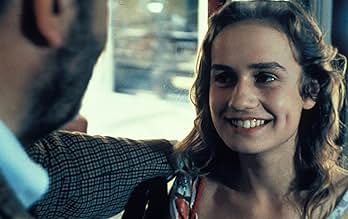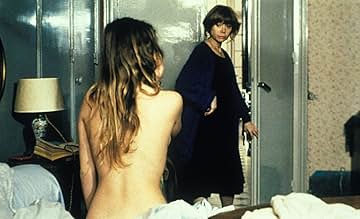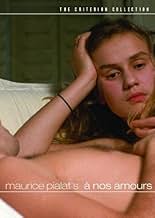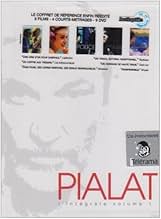À nos amours
- 1983
- Tous publics
- 1h 39m
IMDb RATING
7.1/10
7.6K
YOUR RATING
An erratic young woman's family desperately tries to prevent her increasingly erotic ways.An erratic young woman's family desperately tries to prevent her increasingly erotic ways.An erratic young woman's family desperately tries to prevent her increasingly erotic ways.
- Director
- Writers
- Stars
- Awards
- 4 wins & 3 nominations total
- Director
- Writers
- All cast & crew
- Production, box office & more at IMDbPro
Featured reviews
"The only time I'm happy is when I'm with a guy," says Suzanne, (Sandrine Bonnaire) a promiscuous and directionless teenager. Suzanne's parents are splitting up; her brother beats her as a disciplinary gesture in her father's absence; and her mother has control over nothing. Suzanne hangs out with her friends; sleeps with anyone she is attracted to (except the boy that loves her); and returns home for knock down, drag out fights with her older brother and mother. The last 30 minutes of the film skips quickly into Suzanne's life after marriage and jumps yet again to her life after divorce. The only person Suzanne loves is her father; perhaps because he is the only person who understands and unconditionally loves her. Fine direction from Maurice Pialat who also plays Suzanne's father. Excellent acting from most of the cast saves a somewhat meandering and overwrought script.
For many, the lack of a defined storyline is maddening, often resulting in a less than satisfying experience. Almost stream-of-consciousness in its approach, Maurice Pialat's À Nos Amours does not appear to have much story structure, but the story is most definitely there and is related with a subtlety not often found in modern film.
Bonnaire's portrayal of Susanne is brilliant (as others have said), and her almost wistful sadness permeates the performance. In one scene, her father (played by Pialat) says, "You never smile anymore," indicating the transformation of Susanne from innocence to experience. The men in her life are shown only for the time she is with them. There is neither introduction upon their arrival nor explanation as to their departure. Pialat uses this method to show Susanne's lack of emotional investment in these temporary romances.
The only men who do return are her father, her brother, and Luc, her one real love. It is when she is with these men that she shows her true self, rather than the detached uncaring girl who sleeps around in an effort to replace them. The dialogue drives this film. There is little music, save the inspired use of Klaus Nomi's "The Cold Song". The sad wailing of Nomi's pseudo-operatic vocal against the opening credits of Susanne in the pulpit of a boat is a wonderful moment.
Long out of print, this film is now available on DVD. It is deserving of a look by the discerning cinephile who may have missed it 25 years ago.
Bonnaire's portrayal of Susanne is brilliant (as others have said), and her almost wistful sadness permeates the performance. In one scene, her father (played by Pialat) says, "You never smile anymore," indicating the transformation of Susanne from innocence to experience. The men in her life are shown only for the time she is with them. There is neither introduction upon their arrival nor explanation as to their departure. Pialat uses this method to show Susanne's lack of emotional investment in these temporary romances.
The only men who do return are her father, her brother, and Luc, her one real love. It is when she is with these men that she shows her true self, rather than the detached uncaring girl who sleeps around in an effort to replace them. The dialogue drives this film. There is little music, save the inspired use of Klaus Nomi's "The Cold Song". The sad wailing of Nomi's pseudo-operatic vocal against the opening credits of Susanne in the pulpit of a boat is a wonderful moment.
Long out of print, this film is now available on DVD. It is deserving of a look by the discerning cinephile who may have missed it 25 years ago.
Others have already said that "À nos amours" is a great film, even more have said that Sandrine Bonnaire was a knockout in her demanding rôle as Suzanne. There is a sort of timeline, a beginning and an end, but this is really a film about a personal journey through a part of Suzanne's late adolescence. Young people who have watched the film recently are sometimes very annoyed with Suzanne, but this only proves that Miss Bonnaire has made them care about her character even to the point that they perhaps want to shake her, to take her into a corner and tell her what mistakes she is making. There is also a conflict which some pretend had disappeared by the end of the "swinging sixties" - the generation gap between the sexual mores of parents and adolescents, which was of course still real in the early eighties and remains so in many cultures. Unpredictable behaviour (by Suzanne's brother, for example) is also a real part of family life for many young people. Every time I watch the film (and I have seen it very often, as I used it in my French classes more than once) I notice details which had escaped me or which I had forgotten. Pialat made other great films, but "À nos amours" remains my favourite. If possible watch it in French, with subtitles if necessary - but see it before you die!
A perfect example which illustrates why being truth to life sometimes doesn't often equal great movies. Maurice Pialat wasn't completely truthful in its depiction of youth's shallowness but he isn't completely off mark, just a few objectionable things that look bizarre, too exploitative or unbelievable. But that's life sometimes. "À Nos Amours" ("To Our Loves") focus is a teenage girl (Sandrine Bonnaire) and the way she conducts her sexual relationships, first with a boyfriend, the good hearted Luc (Cyr Boitard), and later evolves to sometimes mindless, sometimes affectionate casual encounters with other guys. Almost fine if it wasn't for her family bothering with this, and a somewhat unpredictable disintegration when her father (Pialat) decides to leave the family. What spirals after that is an emotional roller-coaster with the infatuated girl being a victim of constant reprehension and beatings from her older brother, now head of the family, and the mother who seems to be rotting away into madness, not knowing how to cope with everything happening around her. And there's plenty of time for her dedicate some time with her lovers, miserable for not getting the love she deserves.
One goes through this with plenty of expectations and interest but one walks out with plenty of reservations and little gain. C'mon, this was made in 1980's and you're telling me that even back then, in such a bourgeoisie family, allegedly cultured, they treat the typical adolescent behavior in that horrid way? With punches, yells and stuff? I would expect this in a poorer background. Everything's so over-the-top, so forced, very off-putting. The movie seems to suggest that there's something going on between father and daughter and also between brother and sister, just suggest some incestuous relations but never goes into that deep.
What Pialat captured with some excellency was youth's boredom, trying everything to escape from the usual routine of schools, classmates, and dealing with parents; youth's incapacity to love or find love, or using such as something to pass the time, not knowing what love truly means, going from one relationship to another, desperate to find something new that may cure them from their boredom and apathy towards life. This is clearly evidenced in the scene where the girl has an one night stand with an English sailor. She had her fun, experienced something great but she doesn't show much after the fact, a little worried because she cheated on her boyfriend. It isn't a first rate portrayal, obviously, but it's far more realistic than the other topics already mentioned (the family matters). The movie strangely went absurd towards the ending, giving unexplainable solutions and the strange return of the father.
I enjoyed this movie, enjoyed its good pace, it makes you interested with the very few it has to share. A little saddening that it wasn't all that much of a good film as a Cesar Award winner should be. Bonnaire, in one of her earliest roles, has plenty of qualities despite the relative lack of expression her character has, constantly down, sad, beaten. Far from being the great French cinema but beautiful to look at. 6/10
One goes through this with plenty of expectations and interest but one walks out with plenty of reservations and little gain. C'mon, this was made in 1980's and you're telling me that even back then, in such a bourgeoisie family, allegedly cultured, they treat the typical adolescent behavior in that horrid way? With punches, yells and stuff? I would expect this in a poorer background. Everything's so over-the-top, so forced, very off-putting. The movie seems to suggest that there's something going on between father and daughter and also between brother and sister, just suggest some incestuous relations but never goes into that deep.
What Pialat captured with some excellency was youth's boredom, trying everything to escape from the usual routine of schools, classmates, and dealing with parents; youth's incapacity to love or find love, or using such as something to pass the time, not knowing what love truly means, going from one relationship to another, desperate to find something new that may cure them from their boredom and apathy towards life. This is clearly evidenced in the scene where the girl has an one night stand with an English sailor. She had her fun, experienced something great but she doesn't show much after the fact, a little worried because she cheated on her boyfriend. It isn't a first rate portrayal, obviously, but it's far more realistic than the other topics already mentioned (the family matters). The movie strangely went absurd towards the ending, giving unexplainable solutions and the strange return of the father.
I enjoyed this movie, enjoyed its good pace, it makes you interested with the very few it has to share. A little saddening that it wasn't all that much of a good film as a Cesar Award winner should be. Bonnaire, in one of her earliest roles, has plenty of qualities despite the relative lack of expression her character has, constantly down, sad, beaten. Far from being the great French cinema but beautiful to look at. 6/10
This is the story of a teenage French girl (Sandrine Bonnaire) with a difficult home life. Both her father (who abandons the family) and her older brother (who regularly physically assaults her) seem to have an unnatural interest in her sexuality, while her mother (who may the worst of them all) is a raving hysteric who eggs everyone else on. Not surprisingly, the girl is quite promiscuous, availing herself of any number of boys and men. In an American movie like this, her male paramours would at best be panting dogs and at worst villainous cads taking advantage of a vulnerable girl, but here they're probably the most sympathetic people in the movie!
The young girl is not unsympathetic by any means, but she simply refuses to be a victim and remains firmly in control, and no family member or lover ultimately seems to have much chance against her. She is similar to the kind of "feminist lolitas" that often appear in Catherine Breillat movies like "A Real Young Girl" and "36 Fillete"-- teen girls that are very desirable, but also wise beyond their years and in perfect control of their own sexuality, and thus never simply mere sex objects. It's surprising Bonnaire never worked directly with Breillat because she is a much more self-assured and commanding actress than any of the ones Breillat did work with. I don't know if I believe the IMDb dates regarding Bonnaire's age as her assured acting (and her nude body) suggest that she was somewhat older than the character she's playing here, but she's very impressive regardless. Interestingly, while she became a very formidable actress in her later years (especially in films like Claude Chabrol's "Initiation"), she would not really be one of your more glamorous and sexy French actress. She certainly compares well to her contemporaries at the time like Emmanuelle Beart and Sophie Marceau, but while they would become leading ladies, she stayed more of a character actress.
Ironically, the one problem I had with the movie is that Bonnaire and her character is perhaps TOO self-assured and as an actress Bonnaire tends to dominate the rest of the cast too much. It might be a feminist statement to have young female protagonist who is this self-confident, but I don't know that it's necessarily very realistic.
The young girl is not unsympathetic by any means, but she simply refuses to be a victim and remains firmly in control, and no family member or lover ultimately seems to have much chance against her. She is similar to the kind of "feminist lolitas" that often appear in Catherine Breillat movies like "A Real Young Girl" and "36 Fillete"-- teen girls that are very desirable, but also wise beyond their years and in perfect control of their own sexuality, and thus never simply mere sex objects. It's surprising Bonnaire never worked directly with Breillat because she is a much more self-assured and commanding actress than any of the ones Breillat did work with. I don't know if I believe the IMDb dates regarding Bonnaire's age as her assured acting (and her nude body) suggest that she was somewhat older than the character she's playing here, but she's very impressive regardless. Interestingly, while she became a very formidable actress in her later years (especially in films like Claude Chabrol's "Initiation"), she would not really be one of your more glamorous and sexy French actress. She certainly compares well to her contemporaries at the time like Emmanuelle Beart and Sophie Marceau, but while they would become leading ladies, she stayed more of a character actress.
Ironically, the one problem I had with the movie is that Bonnaire and her character is perhaps TOO self-assured and as an actress Bonnaire tends to dominate the rest of the cast too much. It might be a feminist statement to have young female protagonist who is this self-confident, but I don't know that it's necessarily very realistic.
Did you know
- TriviaIn the original script, the father was due to die and was not scheduled to return at the time of the dinner scene. Maurice Pialat walked into the scene and left the actors to improvise in a situation they hadn't planned for.
- GoofsIn the sequence with the American, Suzanne's outfit changes from a one-shoulder black dress with white stripes trimming just the top of the bodice, to a one-shoulder black&white striped top with a black skirt, and back again.
- ConnectionsFeatured in Sebastian (2024)
- How long is To Our Loves?Powered by Alexa
Details
- Release date
- Country of origin
- Official sites
- Languages
- Also known as
- Les Filles du Faubourg
- Filming locations
- Cité Bergère, Paris 9, Paris, France(Suzanne and Jean-Pierre looking for a hotel)
- Production companies
- See more company credits at IMDbPro
Box office
- Gross worldwide
- $2,575
Contribute to this page
Suggest an edit or add missing content






























